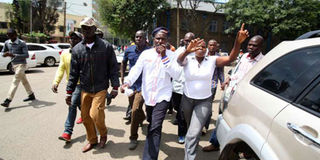Rights and obligations of protesters

Orange Democratic Movement chairman John Mbadi leading Cord supporters along a Nairobi street during anti-IEBC protests on May 23, 2016. He has warned that MPs who snub anti-IEBC protests will face disciplinary action. PHOTO | EVANS HABIL | NATION MEDIA GROUP
What you need to know:
- Protests enable individuals and groups to express dissent and grievances, share views, expose flaws in governance.
- Article 21 of the Constitution binds the State, including the police, to observe, respect, protect and fulfil rights and fundamental freedoms.
- The organisers have an obligation to notify the authorities of the place and time and purpose of the planned assembly.
- Internationally, the right to peaceably protest, picket, and petition is not absolute.
- The police are obliged to ensure that force is only used against violent protesters.
Before the protests agitating for the disbandment of the Issack Hassan-led Independent Electoral and Boundaries Commission were suspended last week, they were in the headlines for weeks.
The State responded with the display and deployment of heavy anti-riot gear and vehicles.
Historically, protests have inspired positive social change and the advancement of human rights globally. They enable individuals and groups to express dissent and grievances, share views and opinions, expose flaws in governance, and publicly demand that the authorities and the powerful rectify problems and are accountable for their actions.
So, what does Article 37 of the Constitution mean in this situation? Five questions arise and depending on which side of the divide you identify with, the answers may be mixed.
First the questions: What is the role of law enforcers in protecting, promoting, and facilitating freedom of assembly? What are the responsibilities and obligations of the organisers of protests? What are the limitations of freedom of assembly and association? Can protests leave all other people unaffected and undisrupted? What are the legal and proportionate actions that police may take to stop illegal protests?
Article 21 of the Constitution binds the State, including the police, to observe, respect, protect, promote, and fulfil rights and fundamental freedoms. This means that police officers’ main objective should be to ensure that the protesters are able to exercise their rights and express themselves. They should identify the procession way and secure it for the protesters. The police should also ensure the safety of pedestrians and prevent criminal activity.
The organisers, on the other hand, have an obligation to notify the authorities of the place and time and purpose of the planned assembly.
Organisers should be concerned for the safety of the public attending the event as well as those who may in any way be affected by it. This means that they should liaise with the police on how best to protect the procession from intruders.
However, it is the primary role of the police to ensure that there is no breach of the law.
PUBLIC SAFETY
Internationally, the right to peaceably protest, picket, and petition is not absolute. Nonetheless, every person possesses this fundamental right. Article 24 of the Constitution dictates that limitations must be prescribed by the law, necessary and proportionate, and pursue a legitimate aim in safeguarding national security or public safety, prevention of disorder or crime, protection of health or morals, or protection of the rights and freedoms of others.
Any restrictions and responses have to apply to similar types of protests equally, without regard to protesters’ message or point of view. Consider the protests witnessed in central Kenya last year regarding runaway alcohol abuse in the region. Kenyans watched as politicians and government officials accompanied protesters and presided over mob destruction of privately owned distilleries.
By their very nature, protests are inconveniencing and disruptive. They threaten the status quo and reveal that sections of the citizenry are dissatisfied.
They are the last resort when parties have failed to address issues in closed spaces. In essence, it is really the inconvenience and disruption that causes people to sit down, talk, and resolve issues. The notion that protests can take place without disrupting and inconveniencing others is a fallacy.
In Kenya, the pre-colonial Public Order Act is the main statute that regulates how and when people can organise to assemble. Many have decried this law as outdated. Moreover, many argue that its provisions do not conform to the 2010 Constitution’s Bill of Rights.
The police are obliged to ensure that force is only used against violent protesters, and only when strictly necessary and in proportion to the threat of violence.
Any deployment of weapons should be authorised by the highest-ranking official on site and exercised only by fully trained law enforcement officers.
Before using weapons, law enforcement officials should give a clear warning of their intent to do so, with sufficient time for the warning to be observed, unless that would unduly place them or others at risk of serious harm.
Mr Kiprono is a senior programmes officer at Article 19 – Eastern Africa. [email protected]. Twitter: @demasvox





